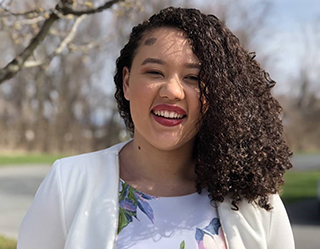Collaborative Project Reveals COVID-19’s Effects on College Students in Foster Care

Advocating at the Foster Youth College Success Campaign annual Advocacy Day in 2019 are, from left, Selena Snow, FLOW vice president; Sarah Mountz, assistant professor in SSW; Nikolas Vasquez, FLOW president; and Angeleek Johnson, EOP counselor.
ALBANY, N.Y. (June 23, 2020) — Imagine yourself moving into a college dorm room without a blanket, sheets or a pillow. And when everyone else is going home for Thanksgiving or the winter break, you have nowhere to go.
This was UAlbany student Selena Snow's reality as a student in the foster care system. As Snow and School of Social Welfare Assistant Professor Sarah Mountz explained on a recent episode of the "Social Workers Hour Radio Talk Show," the unique challenges of staying in college that come with being in foster care were exacerbated by COVID-19 this spring. The show airs Thursday mornings from 10 to 11 a.m. on WCDB 90.9 FM.
As vice president of Fostering Leaders of Our World (FLOW), a UAlbany group composed of students with foster care backgrounds and their allies, Snow has taken her story to the New York State Senate to advocate on behalf of other college students in foster care.
The research that led to FLOW is an ongoing “participatory action research” study, a collaboration among students, the School of Social Welfare and the Educational Opportunities Program (EOP). The group's work is supported by EOP counselor Angeleek Johnson and EOP Director Maritza Martinez. Mountz and Johnson are the faculty advisors.
 |
|
UAlbany junior Selena Snow |
Only 3 percent of young people in foster care graduate from college. These youth often change schools multiple times while growing up (Snow herself attended K-12 schools in Pittsburgh, Las Vegas and New York City before enrolling at UAlbany), and do not have the continuous support of family. In addition to the trauma of being removed from one's home and placed in foster care, they also face the stigma associated with being in foster care, Mountz said.
COVID-19 has simply illuminated the educational disparities already faced by foster youth across the country, she added.
Snow illustrated with her personal story. When most University students went home when classes converted to online formats March due to COVID-19, foster care students like Snow had no place to go. Some have "aged out" of the foster care system at 21. Snow had been discharged from her group home last summer after staying on campus to take extra classes.
Advocates are seeking to urge New York State to extend the "PAUSE" for youth who are aging out of foster care in the midst of COVID-19, according to the Chronicle of Social Change.
Back in March, when Snow saw her friends on campus leave for home, her fear of becoming displaced and homeless was real. Thankfully, the University at Albany allowed her and other students to stay in the dorms, and when the dining halls closed, the University made sure students still living on campus could get takeout from the Campus Center.
Health insurance is another obstacle.
Mountz said foster youth whose agencies are in the city often want them to use a city-based Medicaid provider, despite the fact that they are attending school upstate. This means traveling to the city in middle of a medical crisis, or paying out of pocket for care.
Then there was the complication of retail businesses shutting down.
"I was working three jobs and laid off from all of them," Snow said.
Foster care students like Snow rely on the University Libraries to access computers so they can do their homework and keep up with their studies. Then the libraries had to shut down to prevent the spread of COVID-19.
SUNY secured laptops for those in foster care, but the process takes time, Mountz said.
With a sudden loss of income, even having money to buy cleaning supplies and face masks became an issue. Plus she needed to get on a bus to buy those supplies at the grocery store.
As Professor Eric Hardiman pointed out during the show, Snow has learned how to affect policy and to be a leader in learning that occurred outside of the classroom. Hardiman and Alyssa Lotmore co-host the show.
"Even if I don't get the benefits of the policy I impact, I learned to be selfless and look at the bigger picture, so that I can help other students in foster care who come after me," said Snow. Now a junior pyschology and social welfare major, she takes her message to foster care youth in group homes to let them know they too can go to college and succeed. And she lets them know about programs like EOP, that she did not know about.




